
If you’re an avid Facebook user then judging by what Mark Zuckerberg said Wednesday, your smartphone could soon be filling up with an array of apps created by the social networking giant.
The Facebook boss was discussing plans for a more intense move into mobile during a conference call with analysts regarding the company’s Q4 financial results.
Zuckerberg said during the call that “connecting everyone means giving the power to share different kinds of content with different groups of people,” adding, “This is something we focused on by launching separate mobile apps beyond the main Facebook app – Messenger and Instagram are great examples of this.”
Although he discussed various ideas on how to grow the business over the next decade, he talked of the plan to release more standalone apps as a “three-year initiative” geared toward “building all kinds of new experiences for sharing.”
One such app expected to launch soon is a Flipboard-style news reader app possibly called ‘Paper’. The software has reportedly been in the works for several years and received personal input from Zuckerberg himself.
Mobile: more apps, more ads, more revenue
It’s no surprise that Facebook intends to ramp up its mobile presence – it’s where the ad revenue is, after all. Indeed, Wednesday’s financial figures showed that for the first time the company’s mobile ad revenue now exceeds that of desktop, with 53 percent of Facebook’s income generated via its mobile apps in its most recent quarter.
The rise was helped by an impressive 49 percent year-on-year jump in the number of Facebook’s daily active users on mobile, which now stands at 556 million.
Facebook’s Q4 figures beat analyst expectations as it reported $2.6 billion in revenue, an increase of 44 percent on 12 months earlier. Q4 profits came in at $520 million, a massive increase from the $64 million it managed a year ago.
The company’s current success with its smartphone and tablet presence is certainly a far cry from the concerns it expressed about mobile in its pre-IPO S-1 filing two years ago when it was yet to run its first mobile ad.
“We may not be successful in our efforts to grow and further monetize the Facebook platform,” it said in the document, at the same time warning of negative consequences “if we are unable to successfully balance our efforts to provide a compelling user experience with the decisions we make with respect to the frequency, prominence, and size of ads and other commercial content that we display.”
As balancing acts go, it’s clearly not doing too badly.


